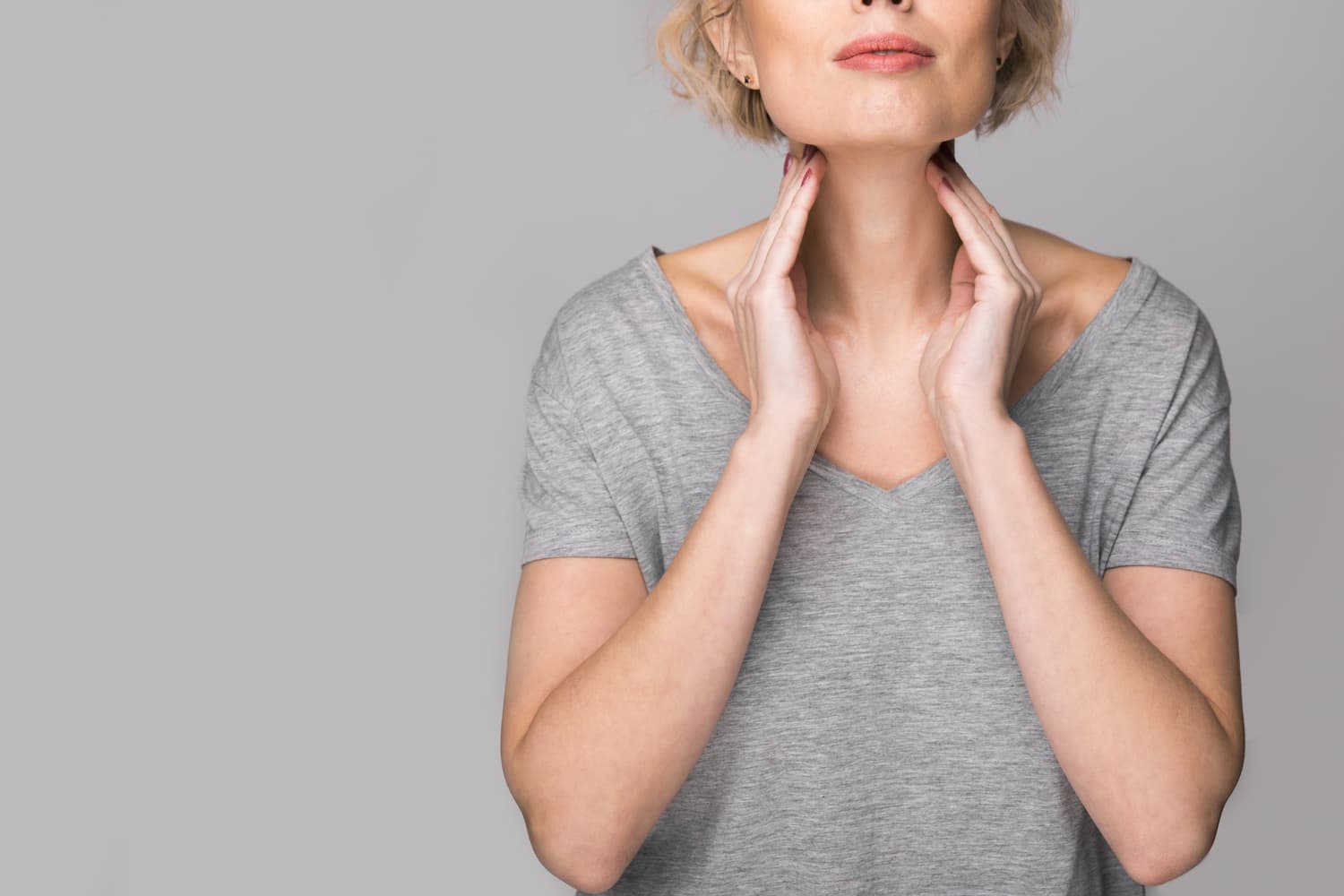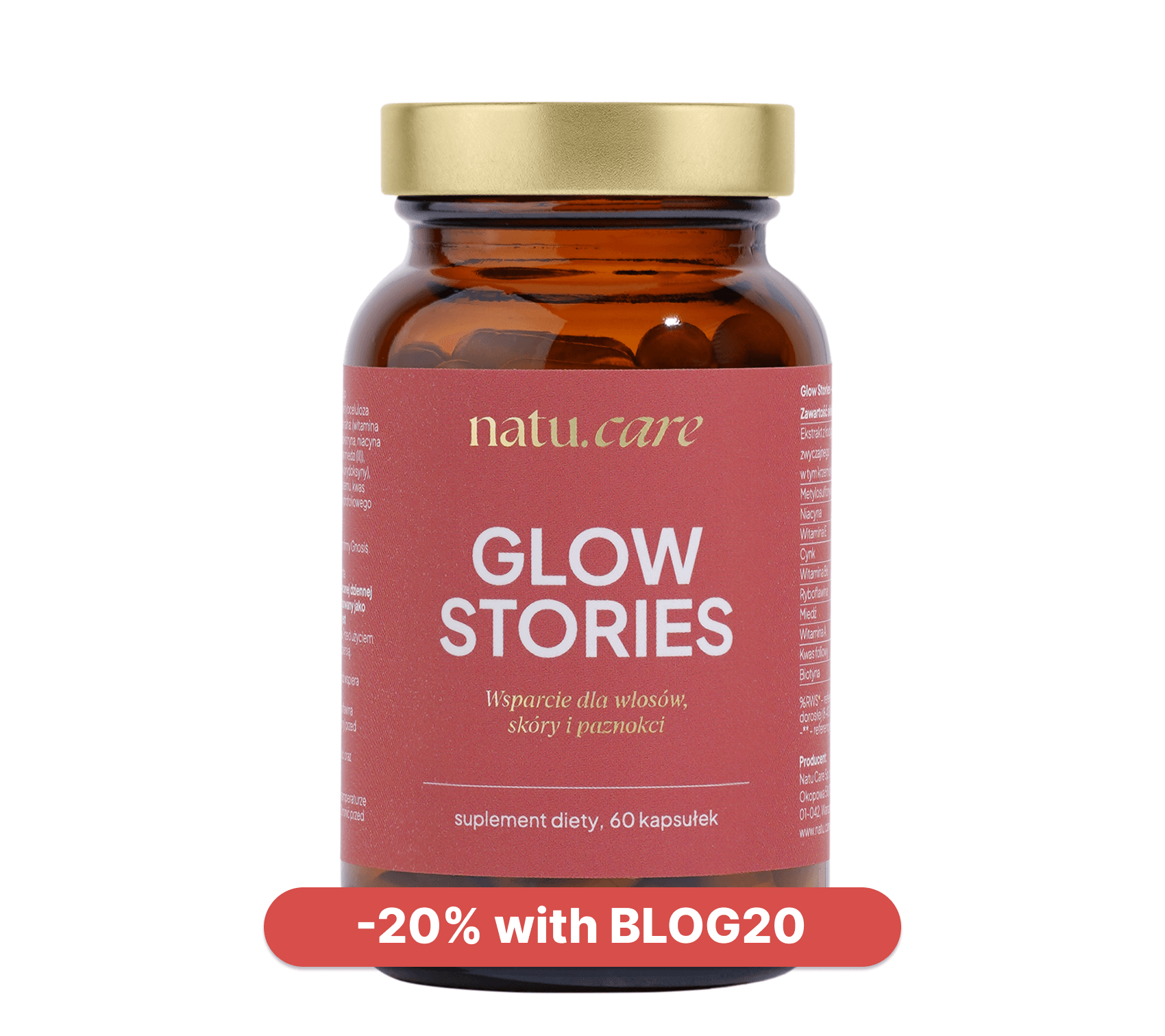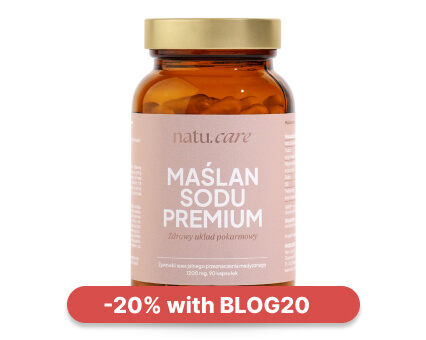Hashimoto's: what is it, symptoms, what tests, how to treat?
Everything you need to know about Hashimoto's - causes, symptoms, treatment + advice from your doctor and nutritionists


Learn more about our editorial process
.

Learn more about our editorial process
.

Learn more about our editorial process
.

Learn more about our editorial process
.
Why you can trust us
Articles on Natu.Care are written based on scientific research, data from government websites and other reliable sources. The texts are written in cooperation with doctors, nutritionists and other health and beauty experts. Articles are reviewed before publication and during significant updates.
.Learn more about our editorial process
.Information about advertisements
Content on Natu.Care may contain links to products from the sale of which we may receive a commission. When creating content, we adhere to high editorial standards and take care to be objective about the products discussed. The presence of affiliate links is not dictated by our partners, and we select the products we review ourselves completely independently.
.Learn more about our terms and Conditions
.Hashimoto's is often called a modern epidemic. Researchers have linked its onset to certain viral infections, including influenza. Women suffer from it 10 times more often than men. It affects up to 1-2% of children, and symptoms are easily overlooked or confused with other conditions.
Although untreated it leads to hypothyroidism and many people treat the diagnosis like a verdict, it is possible to live a normal life with Hashimoto's. How to do this?"
With Dr Witold Tomaszewski, MD, and clinical nutritionists Marta Kaczorek and Julia Skrajda, we tell you everything you need to know about it. Learn about the symptoms of Hashimoto's, its causes, as well as the tests and treatments and dietary indications to tame it and allow you to enjoy every day.
From the article you will learn, among other things:
- What Hashimoto's is and what its symptoms are.
- Who is Hashimoto's?
- Who is at risk of developing Hashimoto's thyroiditis.
- Who is at risk of developing Hashimoto's thyroiditis.
- What diagnostic tests need to be performed. .
- How is Hashimoto's treated. .
- What diet is suitable for people with Hashimoto's. .

Sprawdź, za co pokochały go tysiące klientek Natu.Care Premium Omega-3ᵀᴳ -15% z kodem BLOG15
Natu.Care Omega-3ᵀᴳ Premium
Natu.Care Omega-3ᵀᴳ Premium dla zdrowia serca, mózgu i odporności. Najlepsza przyswajalność. Optymalna dawka 750 mg. Przebadana przez niezależne laboratorium.
Zobacz więcej
Produkt ma super skład, transparentną etykietę i co dla mnie jest ważne – małe kapsułki do połknięcia. Nie ma też nieprzyjemnego efektu odbijania rybą, który miałam spożywając inne produkty. Widzę znaczną poprawę odporności. Polecam!@Kasia P.
The thyroid gland - although a small gland - affects our body's most important functions. Find out more about the thyroid gland itself, the diseases that can affect it, and the tests you should have regularly:
- Thyroid gland - what it is, functions, tests, diseases and treatment
- Hypothyroidism: causes, symptoms, treatment [Doctor's advice] .
- Hypothyroidism: symptoms, causes, treatment [Physician's advice] .
- Psoriasis: symptoms, causes and treatment .
- Thyroid tests - what to do and why are they so important?
Are you experiencing the symptoms described in the article? Get a thyroid test and consult an endocrinologist. Early diagnosis means a better chance of effective treatment!
What is Hashimoto's disease?
.Hashimoto's is an autoimmune disease in which the body's own immune system attacks and gradually destroys thyroid cells. In developed countries, it is one of the most common causes of hypothyroidism.
Hashimoto's disease is one of the most common causes of hypothyroidism.
Hashimoto's disease is also known as chronic autoimmune thyroiditis, chronic lymphocytic thyroiditis (Autoimmune Thyroid Disorder, AITD). In the International Classification of Diseases and Health Problems and you will still find the following terms:
- Lymphoid goitre, .
- Lymphocytic goitre, .
- Lymphocytic thyroiditis, .
- Hashimoto's thyrotoxicosis (transient), .
Remember
.On the Internet one encounters many forms of spelling this disease: hashimoto, hoshimoto, chashimoto, hasimoto, hoshimoto, jashimoto, hashimoyo, hosimoto and many others. Only this notation is correct: Hashimoto.
Major symptoms of Hashimoto's
.
Hashimoto's disease in its early stages may not give you any worrying symptoms. As the disease progresses, you will begin to experience symptoms characteristic of hypothyroidism. Unfortunately, these can be easily confused with other diseases, ignored or blamed on daily stress and busyness.
Hashimoto's gives physical, mental and neurological symptoms. The main symptoms of Hashimoto's are primarily those encountered in hypothyroidism and:
- chronic fatigue, .
- changes in appearance (facial swelling, hair loss, weakened and brittle nails, weight gain, pale and dry skin), .
- muscle and joint pain, .
- problems with bowel movements (constipation), .
- menstrual disorders (irregular and heavy menstruation), .
- problems with libido and fertility, .
- low blood pressure, .
- slow heart rate, .
- lower mood, .
- depression, .
In Hashimoto's disease, the thyroid gland is mainly small and atrophic. However, there are rare cases where it enlarges, forming what is known as a thyroid goiter.
The symptoms associated with Hashimoto's can also be linked to other conditions with underlying autoimmune processes. It is therefore advisable to have thyroid tests done and consult your doctor..
 .
.
Witold Tomaszewskidoctor of medical sciences
.Regular check-ups will help detect possible abnormalities early and address them effectively.
See also:
.What are the causes of Hashimoto's and who is at risk?
.Although the first cases of Hashimoto's were described in 1912, the causes of the disease are still not fully known. However, there are several factors that increase the likelihood of developing the disease and:
- Genes: lymphocytic thyroiditis shows some genetic predisposition. If you have a family history of confirmed cases of Hashimoto's, hypothyroidism or other autoimmune diseases (e.g. Graves-Basedow), your risk increases;
- .
- Gender: women get the disease up to 10 times more often than men, and the risk of getting the disease is up to 4 times higher than for men and; .
- Age: most cases in women are diagnosed between the ages of 30 and 50 ; .
- Hormones: too high levels of oestrogens in the long term can increase a woman's susceptibility to the disease, by stimulating the immune system to produce antibodies, including TPO and TG; .
- Different diseases and conditions: celiac disease, type I diabetes, lupus, rheumatoid arthritis (RA) or Sjögren's syndrome, vitamin B12 deficiency, Addison's syndrome or some liver conditions;
- Iodine excess; .
- Radiotherapy and radiation exposure: an increase in thyroid disease was observed after the nuclear accidents at Fukushima and Chernobyl; .
- Pregnancy: changes in immune function during pregnancy may be factors leading to Hashimoto's or hypothyroidism after the birth of the baby.
Hashimoto's disease has been shown to be associated with infections caused by certain viruses, including the influenza virus. Research is ongoing into other factors, including deficiency and excess of certain micronutrients or chronic stress..
 .
.
Witold Tomaszewskidoctor of medical sciences
.Hashimoto's and hypothyroidism
.There is a common belief that Hashimoto's disease is synonymous with hypothyroidism. This is not true!"Hashimoto's disease can be asymptomatic and only when left untreated can it lead to hypothyroidism in the long term - it is one of its main causes.
Find out more about hypothyroidism itself in the article:
Hashimoto's and thyroid cancer
.The relationship between Hashimoto's disease and cancer formation (carcinogenesis) is not completely known. Scientists have several hypotheses that need to be carefully verified. However, numerous studies and show that people with Hashimoto's suffer from thyroid cancer more often than those without the condition. In addition, they are at increased risk of breast and lung cancer, as well as cancers of the blood, gastrointestinal tract and genitourinary tract.
Diagnosis of Hashimoto's disease - what tests need to be done?
.Diagnosing using only the symptoms of Hashimoto's is difficult and risky. It is crucial to carry out blood tests for the thyroid gland.
.Basic thyroid testsinclude determination of TSH, FT3 and FT4 concentrations. However, these may not be sufficient, so it is worthwhile to also do anti-TPO, anti-TG and TRAb tests, as well as complementary tests such as:
- ThyroidUSG - will help assess the size and structure of the thyroid gland, and detect any nodules or goitre; .
- blood chemistry - any disorders of the thyroid gland may be responsible for the development of other dangerous conditions in the body, which can be more accurately diagnosed through blood tests; .
- lipidogram - people with Hashimoto's and hypothyroidism as a result of slowed metabolism tend to have problems with cholesterol accumulation and are at risk of atherosclerosis and heart attack; .
- Iron determination - a deficiency of iron can lead to, among other things, a decrease in thyroid hormones and anaemia, which often accompanies people with Hashimoto's.
When nodules on the thyroid gland are found, a so-called thyroid scintigraphy is performed. This is an isotopic study of the thyroid gland, which helps to determine the morphology of the gland, as well as the differentiation of the nodule tissue. However, it is rarely performed in cases of Hashimoto's.
.A test often ordered by doctors is the determination of homocysteine. Its elevated concentration may accompany hypothyroidism, but Dr Witold Tomaszewski, M.D., admits that this test usually does not add anything to the diagnostic and therapeutic management.
Respectively, this test is not used in the case of Hashimoto's disease.
Reference values and interpretation
.The reference values of TSH, fT3 and fT4 for adults are:
.- TSH: 0.45-4.5 µU/ml .
- fT3: 4.0-7.8 pmol/l .
- fT4: 10-25 pmol/l .
Each laboratory may have its own range of reference values, depending on the methods it uses. Therefore, consult your GP or endocrinologist for the interpretation of your test results.
Witold Tomaszewski
Important
.The TSH concentration changes with age and is influenced by many factors, such as diet, lifestyle, medications taken or menstruation. A result of 4.1 µU/ml may be as optimal for a 32-year-old woman as 7.7 µU/ml for a 63-year-old. A TSH result alone cannot be the basis for a diagnosis of hypothyroidism, which develops in Hashimoto's disease.
Different TSH and fT3 and fT4 results may suggest a different form of hypothyroidism.
.Hashimoto's disease and high TSH
.- If TSH is above the reference range and fT3 and fT4 are normal, the doctor will most likely diagnose subclinical primary hypothyroidism. If the TSH is below 10 mlU/l, it is necessary to repeat the test after about 15 weeks and refer to an endocrinologist. If the symptoms of hypothyroidism are not severe, it is worth having an ultrasound of the thyroid gland and going for a consultation with an endocrinologist. .
- If TSH is elevated, fT4 is lowered and fT3 is within the reference range or lowered, probably there is primary clinically overt hypothyroidism. Depending on the symptoms, it will be necessary to consult an endocrinologist, have an ultrasound of the thyroid gland and start treatment with l-thyroxine.
Hashimoto's and normal TSH
.- If all indicators are within normal limits, we speak of a state of so-called euthyroidism, i.e. hormonal balance. If a goiter is suspected, including with the presence of nodules, imaging studies should be performed.
- If the TSH and TSH are normal, the hormone balance is not normal.
- If TSH and fT3 are normal or below the reference range and fT4 below normal, it is likely to besecondary hypothyroidism. It is then necessary to rule out adrenal insufficiency and undertake appropriate treatment under the care of an endocrinologist. .
Hashimoto's and low TSH
.Important
Supplementation with biotin can interfere with thyroid test results, especially TSH. To avoid this, its intake should be stopped at least 48 hours before the test.
Testing for Hashimoto's - price
.Hormone testing for thyroid disease is usually available in two packages: basic (TSH, FT3 and FT4) and extended, which includes anti-TPO, anti-TG and TRAb tests in addition to the basic tests. Costs depend on the specific laboratory and the choice of package.
The most cost-effective is the extended package, with prices starting at around £180. You can also choose a package with a doctor's consultation, which will be correspondingly more expensive.
To the full diagnostics, you should add the prices of any supplementary tests (e.g. thyroid ultrasound, morphology, lipidogram, as well as determination of the concentration of iron, homocysteine, vitamin D, glucose or tests for coeliac disease).
.Natu.Care Collagen Premium 5000 mg, mango & passion fruit

- Collagen content: 5000 mg marine collagen hydrolysate
- Additional active ingredients: vitamin C, low molecular weight hyaluronic acid (and L-theanine and coenzyme Q10 in cocoa flavoured collagen or vitamin A and vitamin E in mango–passion fruit flavoured collagen)
- Form: powder sachets
- Dose: 1 sachet per day
- Sufficient for: 30 days
Product description
Fish collagen from the Natu.Care brand in a dose of 5000 mg, based on certified ingredients of the best quality. Regular supplementation will positively influence the appearance of the skinóry, hairów and nails – they will be rebuilt and strengthened from the inside.
In addition to collagen, which is valuable for health and beauty, it also offers other active ingredients that help to maintain a youthful complexion, shiny hair and strong nails.
The formula contains a sufficient portion of the active ingredient to positively affect joints, the musculoskeletal system and immunity.
Natu.Care Premium Collagen is available in two flavours – Cacao Bloom and Rise&Shine. Both formulas are based on the following active ingredients: marine collagen hydrolysate, wild roseóbud extract and hyaluronic acid.
Additionally, Cacao Bloom contains natural L-theanine, coenzyme Q10 and defatted Dutch cacao. Rise&Shine instead contains vitamin E and vitamin A.
These are the best collagens in the world.
These best fish collagens on the market also rós taste – Cacao Bloom is a treat for chocolate lovers. Rise&Shine will appeal to those whoólike the refreshing taste of mangoófruit and passion fruit.
Pros and cons
Pros:
- Vitamin C supports the body's collagen production, enhancing its effectiveness.
- An effective dose of hyaluronic acid, which additionally supports skin hydration and joint health.
- Fish collagen absorbs 50% better. Additionally, the manufacturer specifies the fish species it is sourced from (Atlantic cod).
- The composition has been tested by the independent and accredited J.S. Hamilton laboratory.
- MSC (Marine Stewardship Council) quality certification, which confirms that the collagen source supports sustainable fishing practices.
Cons:
- None.
Additional information
Natu.Care's fish collagen receives praise for its delicious taste. You won't find the fishy aftertaste that often comes through in other collagens. Plus, you have two tasty flavors to choose from: cocoa and mango-passionfruit.
Active ingredients like coenzyme Q10, hyaluronic acid, and natural L-theanine provide anti-inflammatory and antioxidant benefits while slowing down aging processes.
User review
Super, after about 6 weeks of use, the skin on my face became noticeably firmer. Wonderful taste.
Ania ZalewskaNatu.Care customer
Natu.Care Premium collagen 10 000 mg, mango-maracuja

- Collagen content: 10,000 mg marine collagen hydrolysate
- Additional active ingredients: vitamin C, low molecular weight hyaluronic acid (and L-theanine and coenzyme Q10 in cocoa flavoured collagen or vitamin A and vitamin E in mango–passion fruit flavoured collagen)
- Form: powder sachets
- Dose: 1 sachet per day
- Sufficient for: 30 days
Product description
One of the strongest collagens on the market, whichós provides as much as 10,000 mg in a daily serving. This allows the formula to effectively support the condition of the skin, hair and nails.
With this supplement, you will support your beauty, which will allow you to visually stop the ageing process and feel a second youth!
Natu.Care Collagen Premium 10 000 mg comes in two flavours – cherry and mango-maracuja. Both formulas have the same product backbone – collagen, hyaluronic acid and vitamin C.
In the cherry version you additionally find glucosamine, chondroitin and Indian frankincense resin extract. Mango-maracuja, on the other hand, contains vitamin E and vitamin A.
Pros and cons
Pros:
- Tested collagen formula – SeaGarden, whose effects have been confirmed in clinical studies.
- Effective dose of hyaluronic acid, additionally moisturizing the skin and positively impacting joint health.
- Vitamin C supports the body’s natural collagen production.
- The composition has been tested by the independent and accredited J.S. Hamilton laboratory.
- The product has an MSC (Marine Stewardship Council) quality certification – the collagen source supports sustainable fishing practices.
Cons:
- None.
Additional information
Users praise Natu.Care Collagen Premium for the easy dissolvability of the powder.
User review
I noticed a significant improvement in my skin texture after a few weeks of taking collagen regularly. My complexion is now as soft as velvet!
Natu.Care Collagen Premium 10000 mg, cherry

- Collagen content: 10,000 mg of hydrolyzed bovine collagen
- Additional active ingredients: vitamin C, low molecular weight hyaluronic acid, glucosamine, chondroitin, extract of Indian frankincense resin (boswellia serrata)
- Form: powder sachets for drinking
- Serving: 1 sachet per day
- Lasts for: 30 days
Product description
One of the strongest collagens on the market, providing as much as 10,000 mg per daily serving. This product can effectively support the condition of joints, skin, hair, and nails.
With this supplement, you will support your skeletal and joint system as well as your beauty, helping you visually halt the aging process and feel rejuvenated!
Pros and cons
Pros:
- The daily portion of collagen is very large – as much as 10,000 mg.
- Proven collagen formula – COLLinstant, whose effectiveness has been confirmed in clinical studies.
- Effective dose of hyaluronic acid, which additionally moisturizes the skin and positively affects joint health.
- Vitamin C supports the body's natural collagen production.
- Glucosamine is a fundamental building block of compounds found in joint cartilage and a component of collagen that gives elasticity to connective tissue in tendons.
- Chondroitin is a natural component found in the human body, mainly in cartilage. This large molecule (mucopolysaccharide) has the ability to absorb water, which helps maintain the elasticity and resilience of cartilage.
- Frankincense resin extract supports blood circulation and joint mobility and reduces their stiffness. It may help alleviate inflammatory conditions.
- The composition has been tested by the independent and accredited J.S. Hamilton laboratory.
Cons:
- None.
Additional information
Users praise Natu.Care Collagen Premium for the easy dissolving of the powder.
Premium Sodium Butyrate
Product description
Premium Sodium Butyrate is a natural support for your digestive system. With a high dose of butyric acid (940 mg), it supports the regeneration of the intestinal mucosa, improving gut health and function, and aids in the absorption of nutrients. By taking care of your intestines, you're taking care of the health of your entire body.
Studies involving people suffering from irritable bowel syndrome confirm that sodium butyrate is ideal for supporting issues related to bacterial flora imbalances (for example, after antibiotic therapy), constipation and diarrhea, inflammation of the intestinal mucosa, or a diet low in fiber.
Premium Sodium Butyrate capsules are made using the innovative DRcaps® technology. This guarantees that the active ingredients in the product are protected from the destructive effects of stomach acids and digestive enzymes. As a result, we can be sure that the beneficial ingredients are released in the small intestine and are fully absorbed by our body.
Premium Sodium Butyrate from Natu Care is 100% tested, and its composition contains only the highest quality raw materials.
Pros and cons
Pros:
- Supports digestive system function
- Helpful for various gastrointestinal conditions, including IBS
- High dose of butyric acid in each capsule
- Eco-friendly, clean, and tested composition
- Free from added sugar, gluten, GMOs, and lactose
- Innovative capsule technology - DRcaps
Cons:
- None
Additional Information
Take 3 capsules daily at any time of the day, preferably with a meal. Swallow the capsules whole with water.
Premium Sodium Butyrate is intended for adults.
The product should be used under medical supervision.
User review
I've been using the product for 2 weeks. My stomach feels lighter, and my digestion has improved. I recommend it.
Natu.Care Premium Magnesium + Vitamin B6

- Magnesium content per day: 305 mg
- Additional active ingredients: Vitamin B6 (2.1 mg)
- Form: capsules
- Serving size: 3 capsules per day
- Sufficient for: 30 days
Product description
The Premium Magnesium + Vitamin B6 dietary supplement is a comprehensive product that combines three organic forms of magnesium (citrate, malate, and diglycinate) and vitamin B6 in highly absorbable forms.
Magnesium is an essential mineral without which our bodies cannot function properly. It supports the immune, nervous, and muscular systems, maintains electrolyte balance, and is involved in cell division and the regulation of mental functions.
Research shows that magnesium supplementation is even more effective when accompanied by vitamin B6, which is included in our product. Vitamin B6 is responsible for the proper functioning of the nervous and immune systems, as well as the proper functioning of the heart.
If you want to safely get rid of feelings of fatigue, concentration problems, hair loss, muscle cramps, trembling, or irritability, reach for Premium Magnesium from Natu.Care, tested by the independent, certified laboratory J.S. Hamilton Poland.
Pros and cons
Pros
- Supports the proper functioning of the nervous and immune systems.
- Reduces feelings of fatigue and tiredness.
- Maintains proper psychological functions.
- The purity of the ingredients (free from anti-caking agents, artificial fillers, and additives such as titanium dioxide, microcrystalline cellulose, talc, magnesium stearate, and silicon dioxide) has been confirmed by laboratory tests.
- High absorption of ingredients.
- Soft capsules that are easy to swallow.
- Suitable for vegetarians and vegans.
Cons
- None.
Additional information
Take with a meal, 3 capsules per day.
The capsules should be taken with at least 250 ml of water.
If you have trouble sleeping, it is advisable to take 1 capsule in the morning and 2 capsules in the evening, no later than 4 hours before bedtime.
Avoid combining with products high in calcium (milk, yogurt, cheese), as this may negatively affect magnesium absorption.
Pregnant and breastfeeding women should consult a doctor before starting supplementation.
User review
I’m very impressed with the speed of delivery. The product itself is of high quality and absorbs well. After two weeks of supplementation, I’ve noticed a significant improvement in muscle recovery, especially during periods of intense training. I highly recommend it!
Product description
The dietary supplement contains omega-3ᵀᴳ, or omega-3 acids in the form of trójglyceridesów. Scientific studies suggest that this form of fatty acidsós up to 2 times better absorbed than the estersós present in many dietary supplements on the market. This means that you are assured of their effectiveness and of supplying yourself with valuable omega acids.
Fatty acids omega-3 are derived from wild anchovy oil. It is a rich source of healthy fats that are essential for the health of the cardiovascular, immune and nervous systems, as well as the proper function of vision, joints muscles.
Scientific research suggests that wild anchovies are a good source of healthy fats.
Scientific research also suggests that an adequate intake of omega-3 fatty acidsós protects against and supports the treatment of depression and anxiety disorders. In addition, omega-3s influence the hydration and appearance of the skinóry and support healthy sleep.
.
The formula contains a total of 750 mg of EPA+DHA acidsós, which is three times higher than the recommended minimum of 250 mg for the Polish population. Omega-3 TG Premium has studies indicating that its TOTOX is 9, which is a very good result.
Supplementation of omega-3 fatty acidsóis recommended for anyone who does not eat 1–2 portions (approximately 300 g) of oily fish per week. Children during growth, seniors, physically active people, vegans and vegetarians, as well as patients undergoing cardiovascular treatment and prevention of heart disease also have an increased need.
Pros and cons
The dietary supplement contains omega-3ᵀᴳ, or omega-3 acids in the form of trójglyceridesów. Scientific studies suggest that this form of fatty acidsós up to 2 times better absorbed than the estersós present in many dietary supplements on the market. This means that you are assured of their effectiveness and of supplying yourself with valuable omega acids.
Fatty acids omega-3 are derived from wild anchovy oil. It is a rich source of healthy fats that are essential for the health of the cardiovascular, immune and nervous systems, as well as the proper function of vision, joints muscles.
Scientific research suggests that wild anchovies are a good source of healthy fats.
Scientific research also suggests that an adequate intake of omega-3 fatty acidsós protects against and supports the treatment of depression and anxiety disorders. In addition, omega-3s influence the hydration and appearance of the skinóry and support healthy sleep.
.
The formula contains a total of 750 mg of EPA+DHA acidsós, which is three times higher than the recommended minimum of 250 mg for the Polish population. Omega-3 TG Premium has studies indicating that its TOTOX is 9, which is a very good result.
Supplementation of omega-3 fatty acidsóis recommended for anyone who does not eat 1–2 portions (approximately 300 g) of oily fish per week. Children during growth, seniors, physically active people, vegans and vegetarians, as well as patients undergoing cardiovascular treatment and prevention of heart disease also have an increased need.
Additional information
The dietary supplement contains omega-3ᵀᴳ, or omega-3 acids in the form of trójglyceridesów. Scientific studies suggest that this form of fatty acidsós up to 2 times better absorbed than the estersós present in many dietary supplements on the market. This means that you are assured of their effectiveness and of supplying yourself with valuable omega acids.
Fatty acids omega-3 are derived from wild anchovy oil. It is a rich source of healthy fats that are essential for the health of the cardiovascular, immune and nervous systems, as well as the proper function of vision, joints muscles.
Scientific research suggests that wild anchovies are a good source of healthy fats.
Scientific research also suggests that an adequate intake of omega-3 fatty acidsós protects against and supports the treatment of depression and anxiety disorders. In addition, omega-3s influence the hydration and appearance of the skinóry and support healthy sleep.
.
The formula contains a total of 750 mg of EPA+DHA acidsós, which is three times higher than the recommended minimum of 250 mg for the Polish population. Omega-3 TG Premium has studies indicating that its TOTOX is 9, which is a very good result.
Supplementation of omega-3 fatty acidsóis recommended for anyone who does not eat 1–2 portions (approximately 300 g) of oily fish per week. Children during growth, seniors, physically active people, vegans and vegetarians, as well as patients undergoing cardiovascular treatment and prevention of heart disease also have an increased need.
Expert opinion
The dietary supplement contains omega-3ᵀᴳ, or omega-3 acids in the form of trójglyceridesów. Scientific studies suggest that this form of fatty acidsós up to 2 times better absorbed than the estersós present in many dietary supplements on the market. This means that you are assured of their effectiveness and of supplying yourself with valuable omega acids.
Fatty acids omega-3 are derived from wild anchovy oil. It is a rich source of healthy fats that are essential for the health of the cardiovascular, immune and nervous systems, as well as the proper function of vision, joints muscles.
Scientific research suggests that wild anchovies are a good source of healthy fats.
Scientific research also suggests that an adequate intake of omega-3 fatty acidsós protects against and supports the treatment of depression and anxiety disorders. In addition, omega-3s influence the hydration and appearance of the skinóry and support healthy sleep.
.
The formula contains a total of 750 mg of EPA+DHA acidsós, which is three times higher than the recommended minimum of 250 mg for the Polish population. Omega-3 TG Premium has studies indicating that its TOTOX is 9, which is a very good result.
Supplementation of omega-3 fatty acidsóis recommended for anyone who does not eat 1–2 portions (approximately 300 g) of oily fish per week. Children during growth, seniors, physically active people, vegans and vegetarians, as well as patients undergoing cardiovascular treatment and prevention of heart disease also have an increased need.
Natu.Care Vitamin D 2000 UI
Product description
Vitamin D plays a crucial role in our health and well-being. It affects calcium and phosphate metabolism, which translates to healthy bones and teeth. It also helps regulate the immune system, and studies indicate its influence on the functioning of the nervous system.
Vitamin D, although called a “vitamin,” is actually a prohormone that our body produces on its own, primarily under the influence of sunlight. Unfortunately, our modern lifestyle contributes to deficiencies of this essential vitamin. Working in enclosed office buildings, using (necessary!) SPF creams, and covering the body with clothing all make it very difficult, if not impossible, to obtain adequate levels of vitamin D from sunlight. This is why appropriate, year-round supplementation is so crucial.
Vitamin D from Natu.Care is a well-tested vitamin D3 suspended in safflower oil, a plant known for its numerous health benefits. The convenient, easy-to-swallow capsule will make supplementation a part of your daily, healthy routine, improving your overall well-being.
Pros and cons
Pros:
- Ensures proper functioning of the immune system
- Supports the maintenance of healthy bones and teeth
- Maintains proper heart, kidney, and muscle function
- Tested by an independent, certified laboratory
- Convenient and easy-to-swallow capsule
- Clean composition - free from added sugar, gluten, GMOs, lactose, and without preservatives or colorants
Cons:
- None.
Additional Information
Pregnant women and breastfeeding mothers should consult a doctor before using the product. This dietary supplement is intended for a healthy adult population up to the age of 75.
Collagen Booster - Glow Stories

- Active ingredients: bamboo shoot extract, Quatrefolic®, L-Methionine, L-cysteine, vitamin E, vitamin A, niacin (vitamin B3), vitamin B6, vitamin B2 (riboflavin), biotin, zinc, copper
- .
- Form: capsules
- .
- Dose: 1 capsule per day
- .
- Sufficient for: 60 days
- .
Product description
A dietary supplement containing vitamins, minerals and plant extracts thatósupport the skinóhand, hair and nails. The product is especially distinguished by the form of folate – it is Quatrefolic, whichós absorbed very well and is natural.
In addition to valuable vitamins and minerals, such as vitamin A, E, B3, B2 and biotin, the formula contains bamboo shoot extract, whichóry further enhances your beauty.
Pros and cons
A dietary supplement containing vitamins, minerals and plant extracts thatósupport the skinóhand, hair and nails. The product is especially distinguished by the form of folate – it is Quatrefolic, whichós absorbed very well and is natural.
In addition to valuable vitamins and minerals, such as vitamin A, E, B3, B2 and biotin, the formula contains bamboo shoot extract, whichóry further enhances your beauty.
Additional information
A dietary supplement containing vitamins, minerals and plant extracts thatósupport the skinóhand, hair and nails. The product is especially distinguished by the form of folate – it is Quatrefolic, whichós absorbed very well and is natural.
In addition to valuable vitamins and minerals, such as vitamin A, E, B3, B2 and biotin, the formula contains bamboo shoot extract, whichóry further enhances your beauty.
Hashimoto's in women
.Thyroid problems are commonly regarded as typically female ailments. They affect virtually all spheres of life - including such intimate ones as sex life, fertility and motherhood and.
Hashimoto's and the menstrual cycle
.Hashimoto's and hypothyroidism cause a disruption of the menstrual cycle. Menstruation is then more abundant, more painful and more irregular - in some cases it can even disappear for several months and.
Hashimoto's and libido and fertility
.One of the key functions of the thyroid gland is hormone regulation. This has implications for sex life and fertility in both men and women and.
- Hypothyroidism-related dysfunctions occur less frequently in women (22-46%) than in men (59-63%); .
- Women are more likely to report problems with desire, impaired arousal and sense of pleasure, and pain during intercourse;
- Women are more likely to report problems with desire, impaired arousal and sense of pleasure, and pain during intercourse.
Correct treatment most often leads to a definite improvement in sexual function and satisfaction.
See also:
Hashimoto's and pregnancy
.Stabilising Hashimoto's and hypothyroidism is a key issue for couples planning children and women who are already pregnant and.
Conception itself can be difficult, and untreated hypothyroidism during pregnancy increases the risk of premature birth, miscarriage or pre-eclampsia .
.What's more, for the first three months, the baby takes over the thyroid hormones from the mother. If it receives too few of these, this can result in, among other things, problems with normal growth or the development of the nervous system and brain .
Worth knowing
.Infant screening for hypothyroidism is performed in Poland. If any abnormalities are detected, the child is given highly specialised help.
Hashimoto's and the menopause
.Hashimoto's and hypothyroidism overlap in many ways with the symptoms of the menopause. Fatigue, sleep disturbances or mood swings - progressive hypothyroidism can increase both the number and severity of overlapping symptoms and.
Important
.In the US, only 1 in 4 peri-menopausal women who seek medical attention for symptoms are screened for thyroid disease.
Research shows that women with confirmed thyroid disease have experienced improvements in menopause-related symptoms following thyroid treatment and.
Does Hashimoto's occur in men?
.Although Hashimoto's affects women 10 times more often, this does not mean that the disease completely bypasses men.
The most characteristic symptoms of Hashimoto's in men are and:
- weight gain unrelated to diet or lifestyle changes; .
- pale and dry skin; .
- metabolic problems (e.g. frequent constipation);
- fatigue.
- swollen face; .
- weakness and pain in muscles and joints; .
- increased sensitivity to cold; .
- problems with libido, erectile dysfunction and sexual function; .
- problems with fertility (poorer semen quality - fewer sperm, abnormal structure and reduced motility); .
- concentration and memory problems; .
- depressive states; .
Hashimoto's disease in children
.Hashimoto's disease is the most commonly diagnosed thyroid disease in children. It affects up to 1-2% of children regardless of age and.
The incidence of Hashimoto's in children depends on:
.- gender, .
- genetic predisposition, .
- ethnic origin, .
- exposure to iodine (diet, supplementation, radiotherapy), .
- presence of other autoimmune diseases and genetic syndromes, .
Hashimoto's disease is most commonly diagnosed in children aged 6-16 years, in Caucasians and in iodine-deficient countries. In addition, it is found in children with and:
- type I diabetes, .
- celiac disease, .
- addison's disease,
- diabetes, and
- Bottom's syndrome,
- Down's syndrome
- Turner's syndrome,
- Turner's syndrome
- Klinefelter's syndrome, .
- Noonan syndrome, .
The symptoms of Hashimoto's in children are virtually identical to those in adults. In children, thyroid hormones are responsible for physical and mental development. Their deficiency may be responsible for, among other things, late teething, stunted or delayed puberty, slow growth or mental disorders and.
Children with Hashimoto's and developing hypothyroidism may underperform academically, be lethargic, apathetic and socially withdrawn.
Some parents blame such a condition on their child's humours or character. Unfortunately, the causes can be much deeper than just a weaker day. If this situation has been going on for a long time in your child and you don't see any change, consult your doctor and get tested for Hashimoto's and thyroid disease.
Hashimoto's: treatment, diet, activity and lifestyle changes
.Some patients with Hashimoto's do not require drug treatment. As long as the TSH and fT4 values are within reference ranges and the thyroid gland is of normal size, constant monitoring of the situation will be necessary, as the disease can lie dormant for many years and not produce significant symptoms.
How is Hashimoto's treated?
.It is not possible to halt or reverse the progression of Hashimoto's disease. Treatment boils down to therapy for hypothyroidism and hormone balance and. It mainly involves taking l-thyroxine, a synthetic version of the hormone produced by the thyroid gland. With a properly established dose, TSH will return to normal and the body will start to function better.
Consistent medical care and regular thyroid tests are necessary to help control symptoms and select the correct dose of medication.
Although treatment of Hashimoto's (like hypothyroidism) usually lasts a lifetime, appropriate therapy ensures that the disease does not affect length or quality of life.
Unmedicated Hashimoto's - effects and complications
.Unmedicated Hashimoto's disease can result primarily in the development of phenomenal hypothyroidism.
Unmedicated Hashimoto's disease can result primarily in the development of phenomenal hypothyroidism.
Alongside this, the following can occur and:
.- .
- elevated cholesterol levels, .
- hypertension and cardiovascular disease, .
- anaemia,
- hypotension and cardiovascular disease,
- hypertension and cardiovascular disease,
- aemia
- hypometabolic coma - a life-threatening condition in which there is a decrease in vital functions, hypothermia, oedema or hypoglycaemia;
- Hashimoto's encephalopathy - a disorder that can manifest with stroke-like episodes, cognitive decline or neuropsychiatric symptoms. Although the first case was described in 1966, it has still not been thoroughly studied and the exact causes of its occurrence have not been determined. However, corticosteroid treatment is known to be effective ; .
- problems with fertility and getting pregnant; .
- depression - Hashimoto's disease is often accompanied by psychiatric disorders, including anxiety and depression. The exact correlation is not yet known, but a very strong link between mental state and thyroid function has been confirmed so far; .
Important
The American Association of Clinical Endocrinologists recommends that every patient diagnosed with depression should have regular thyroid tests ordered.
Diet for Hashimoto's - what to eat and what not to eat?
.A balanced diet and an active lifestyle play an important role in the treatment of Hashimoto's disease - especially as many people's symptoms persist even after taking medication. In addition, they reduce the risk of other conditions that people with Hashimoto's are at risk of (such as the development of autoimmune diseases, high cholesterol, obesity or diabetes).
There is no specific diet specifically recommended for people with Hashimoto's. It is recommended that menus should be well balanced and rich in nutrients and.
In your diet, follow the principles of healthy eating, not precepts or prohibitions. Balance is the key. Don't be fooled by internet myths!.
 .
.
Julia SkrajdaDietitian
.For Hashimoto's thyroiditis, it is worth including the following food groups in the diet:
.- Fruits (e.g. berries, peaches, citrus, bananas, pineapple); .
- Starchy vegetables (e.g. yams, potatoes, peas, squash);
- Healthy vegetables (e.g. yams, potatoes, peas, squash).
- Healthy fats (e.g. avocado, avocado oil, olive oil, coconut oil, natural yoghurt);
- Zoon protein (e.g. salmon, eggs, cod, turkey, prawns, chicken); .
- Gluten-free grains (e.g. oatmeal, quinoa, brown rice); .
- Seeds and nuts (e.g. cashews, almonds, macadamia nuts, sunflower seeds, pumpkin seeds, peanut butter);
- Dairy and its substitutes enriched with calcium and vitamin D (e.g. coconut milk, cashew milk, goat cheese, almond milk, kefir);
- Beverages (e.g. water, unsweetened tea, yerba mate); .
- Spices (e.g. curcumin, basil, black pepper and piperine, saffron, apple cider vinegar); .
legumes (e.g. beans, lentils and chickpeas) are best eaten after heat treatment.
For Hashimoto's and hypothyroidism, it is extremely important to take l-thyroxine medication hygienically, as this increases its absorption and effectiveness. Take l-thyroxine in the morning, on an empty stomach and accompanied by products with vitamin C. Sip the medication with low-calcium water..
 .
.
Marta Kaczorek clinical nutritionist and personal trainer
Additionally, after taking medication, avoid the following in particular:
.- soy and soy products, .
- coffee, .
- grapefruit juice, .
- substantial amounts of dietary fibre, .
- nutrients and calcium-rich products,
- fiber foods and supplements.
- products and supplements rich in iron. .
The absorption of levothyroxine may also be impaired by coeliac disease, gastrointestinal complaints and lactose intolerance and.
.Eliminating or limiting certain food groups can help reduce Hashimoto's symptoms and improve overall health:
- sugar and sweetened products (e.g. fizzy and energy drinks, confectionery, breakfast cereals, ice cream, biscuits);
- highly processed foods.
- highly processed and fast food;
- pasta, pasta, bread and other foods.
- products with refined grains, .
- grains and products containing gluten (especially for people with coeliac disease); .
Worth remembering
.These recommendations can help many people, but every patient's story is different, so it is worth experimenting with the diet to find the best option for you. The best option would be to consult with an experienced clinical dietitian to work with them to put together a suitable menu.
People with Hashimoto's need to watch out for so-called goitrogens, which are goitrogenic substances that interfere with the absorption of iodine. They can be found in brassica vegetables (e.g. cabbage and Brussels sprouts), cruciferous vegetables (e.g. cauliflower, kale or broccoli), legumes (beans, lentils or soya beans), turnips, swedes or mustard, among others.
Because of their goitrogen content, it is recommended to restrict the consumption of these foods raw. However, just cook them uncovered (goitrogens are volatile compounds, and heat treatment reduces their amount by 30%), and you can eat them without much concern and.
Supplementation in Hashimoto's disease - what can help?
.People with Hashimoto's are more likely than others to be deficient in certain nutrients that can help fight inflammation in the body. Some of these you will supplement with your diet, others need to be supplemented additionally.
The most important ingredients to supplement for Hashimoto's are and:
- selenium - according to research, a dose of as little as 200 μg of selenium per day can help reduce TPO antibodies. You can find it in salmon, cereal products, dairy products or Brazil nuts, among others; .
- Zinc - it is needed for the synthesis of thyroid hormones, and a deficiency of zinc can cause hypothyroidism. Zinc is also helpful in combating hair loss; .
- vitamin D - vitamin D deficiency, according to research, often occurs in Hashimoto's disease. Zinc is present, for example, in wheat bran, flax seeds and pumpkin seeds: .
- Omega-3 acids - one of the powerful antioxidants with tremendous anti-inflammatory potential. Omeega-3 acids can be found, for example, in avocados, olive oil, pumpkin seeds, nuts or oily fish;
- B vitamins - people with Hashimoto's are at risk of vitamin B12 deficiency. Taking a complex B vitamin raises levels of vitamin B12 and others in this group;
- magnesium - researchers have linked low magnesium levels to an increased risk of Hashimoto's. Magnesium-rich foods include wheat bran, pumpkin seeds, cocoa, chia seeds and almonds;
- Iron - is involved in the metabolism and synthesis of thyroid hormones. Iron deficiency consequently leads to anemia, which is one of the consequences of hypothyroidism. The best sources of iron are thyme, marjoram, dried seaweed or chicken liver.
Other substances that can help people with Hashimoto's include fish oil, alpha-lipoic acid and N-acetylcysteine.
Before starting vitamin D supplementation, determine your vitamin D levels and check them regularly, as there are cases of overdose..
 .
.
Witold Tomaszewskidoctor of medical sciences
.Spices, plants and herbs for Hashimoto's - is it worth it?
.Increasing interest in natural medicine means that more and more people are using plants and herbs recommended for Hashimoto's.
Here are the most popular ones:
- ashwagandha - as an adaptogen, it acts to normalise many of our body's functions, including the hypothalamic-pituitary-adrenal axis, which is important for proper thyroid function. There is a study that suggests that a daily dose of 600 mg of ashwagandha may help patients with subclinical hypothyroidism;
- Maca root - has widely documented supportive effects for symptoms experienced by people with thyroid disorders. It supports fertility and bone health. It helps us have more energy, the brain starts to function better, and libido and sex drive increase. Due to the presence of goitrogens, supplementation should be taken with caution; .
- curcumin - regular use of curcumin can reduce the risk of and development of will; .
- white quinine - quinine extract has a positive effect on the treatment of thyroid disease, both hypothyroidism and hyperthyroidism; .
- garlic - helps fight inflammation and supports blood sugar metabolism; .
- ginger - regular consumption of at least 1,000 mg of ginger per day can reduce such important symptoms of hypothyroidism as dry and pale skin, weight gain and reduced cold tolerance; .
- Mountain rhodiola - extract from Rhiodola rosea stimulates the nervous system, helps to increase productivity and efficiency at work, supports the treatment of depression and helps to get rid of fatigue, which are important symptoms of the clinical form of hypothyroidism.
Remember
.Always use supplements and herbs for Hashimoto's as a support. They should never replace the recommended treatment. Before including them in your diet, consult with your health care provider to rule out possible side effects and negative interactions with medications.
Consider the following.
Hashimoto's and alcohol
.The 'relationship' between alcohol and the thyroid gland, including Hashimoto's disease, is quite complicated and.
.On the one hand, long-term alcohol drinking can damage thyroid cells and impair thyroid function, including the production of thyroid hormones. People with alcohol use disorders also often have lower TSH concentrations, which can lead to hypothyroidism.
These are the most common findings.
On the other hand, there are studies (from the Netherlands, Denmark or China) that suggest that moderate alcohol consumption may reduce the incidence of hypothyroidism and.
.Scientists do not fully know how alcohol interacts with autoimmune thyroid disease. A common feature of these studies is that fewer TPO antibodies are involved in the development of these conditions.
This does not mean, however, that if you drink alcohol you will not develop Hashimoto's!
Alcohol has also so far not been shown to have negative interactions with levothyroxine, used in the treatment of Hashimoto's and.
Do not under any circumstances use alcohol as a preventative measure or treatment for Hashimoto's. It is the third biggest risk factor for diseases and disorders that affect the hypothalamic-pituitary-thyroid axis. Alcohol abuse can lead to dangerous consequences, including addiction, liver disease, high blood pressure or anxiety and.
Worth remembering
.Restricting alcohol intake is one part of a healthy lifestyle, which is also recommended for people with thyroid disorders.
How to lose weight with Hashimoto's? Activity and training with Hashimoto's
.Thyroiditis is often accompanied by disturbances in carbohydrate metabolism or problems with the absorption of individual nutrients. In addition, there may be what is known as slowed metabolism, which means that some of the energy we provide with food is stored rather than processed.
.This all comes with a significant risk of weight gain. If your BMI is greater than 24.9, it's worth following a slightly reductive diet to shed weight. Start by reducing your calorie supply by 200-300 kcal. Cutting calories too restrictively can take a toll on your wellbeing and health. It also increases the risk of yo-yo effect.
Daily diet should go hand in hand with physical activity. The World Health Organisation recommends at least 150 minutes of moderate physical activity or 75 minutes of intense exercise per week and.
We all know the legendary phrase that all movement counts. This is also confirmed by clinical nutritionist and personal trainer, Marta Kaczorek:
.People with Hashimoto's should take care of the so-called NEAT, i.e. energy expenditure resulting from non-sporting activities..
.
This includes any form of movement - cleaning, shopping, walking to work, marching during calli time or playing with your children.
You can train for anything you like - pool, cycling, jogging.
Find an activity that suits you best and use it regularly - this is how you will reduce weight and improve your fitness and performance..
 .
.
Marta Kaczorekclinical nutritionist and personal trainer
Both strength and cardio training should be tailored to your health and wellbeing. Observe your body and see how your body reacts. If you feel you can't do it today - do the workout tomorrow. Understanding and accepting yourself is really important.
.Also make sure you get a good night's sleep and adequate regeneration.
And don't forget to get plenty of sleep.
Important
Changing your dietary and lifestyle habits can significantly reduce antibody levels, improve thyroid function and reduce the severity of symptoms caused by Hashimoto's thyroiditis.
Important
.Want to know more about thyroid health?
.See also:
.- Thyroid - what it is, functions, research, diseases, treatment .
- Hypothyroidism: causes, symptoms, treatment .
- Hypothyroidism: symptoms, causes, treatment
How to live with Hashimoto's? Find out Natalia's story
.Although it doesn't make itself known too much for years, it causes many problems. It is difficult to diagnose quickly and effectively. Lack of support, anxiety, uncertainty - these are feelings that are compounded for many people with Hashimoto's who do not know it. This was also very much the case for Natalia Grajcar, one of the founders of Natu.Care.
.For years I could not cope with many weird symptoms. My hair was falling out by the handful, my skin was severely dry. I could sleep for up to a dozen hours and still get up... drowsy. I was still cold, I couldn't concentrate on work or relationships. I walked around tired and had anxiety..
 .
.
Natalia Grajcarco-founder of Natu.Care
Stabilising the disease and learning to live with it normally did not come immediately. "I'm still learning it, it's an ongoing process that requires work, effort. I had to completely re-evaluate my life and face my weaknesses". - recalls Natalia.
.Choosing the right doctor proved to be crucial. "When I started my struggle with Hashimoto's and hypothyroidism knowledge and awareness of them was much less than it is today. I went from doctor to doctor until I finally came across an empathetic specialist with whom I felt really safe. His support both at the time of diagnosis and during treatment were really important to me. Without him, or the help of those closest to me, it would have been so much harder."
What was the most important thing about all this?"
.Now I know that I worked for this condition for years: a life of constant running and stress, lack of sleep and balanced nutrition. It was a breakthrough to be able to look at my illness from the sidelines and joyfully realise that I was in the process of healing. Maybe there were a few twists and turns in between. I may have been going in small steps, but I was doing it consistently. I had my goal - to improve my health and comfort in my daily life. I succeeded!.
 .
.
Natalia Grajcar co-founder of Natu.Care
Want to live a healthy and happy life? Do regular preventive checkups! Why are they so important? You can find out in our articles:
- Thyroid tests - symptoms, preparation, norms .
- Blood tests: how to prepare, when and where to perform, how to interpret the results .
- Cortisol testing - norms, price, symptoms and indications
- Hepatic tests - what are they and when to perform them?
Summary
.In brief
Hashimoto's disease still sounds like a sentence to many. Fortunately, it is possible to live a long and normal life with it. From this text, remember that:
- Hashimoto's is an autoimmune disease showing some genetic predisposition, in which the immune system attacks and slowly destroys the thyroid gland.
- Hashimoto's disease is an autoimmune disease showing some genetic predisposition, in which the immune system attacks and slowly destroys the thyroid gland.
- The development of Hashimoto's disease depends on many factors, such as gender, hormones, radiotherapy or certain diseases and genetic syndromes.
- Hashimoto's disease is one of the main causes of hypothyroidism.
- Hashimoto's disease is one of the main causes of hypothyroidism.
- Hashimoto's produces physical, psychological and neurological symptoms - these can be easily missed and attributed to other conditions.
- Diagnosis of Hashimoto's includes basic and expanded thyroid tests (TSH, FT3, FT4, anti-TPO, anti-TG, TRAb), as well as complementary tests, including ultrasound, morphology or lipidogram. .
- In Hashimoto's, the causes are not treated, only the symptoms. Treatment mainly involves taking l-thyroxine preparations, follow-up examinations and constant medical care.
- There is no special treatment for Hashimoto's.
- There is no special diet for people with Hashimoto's - it is necessary to follow a balanced and healthy diet.
- Supplementation in Hashimoto's should include omega-3 fatty acids, selenium, zinc, iron, B vitamins and magnesium, among others. .
FAQ
.What is Hashimoto's disease?
.Hashimoto's is an autoimmune disease in which the immune system attacks the thyroid gland. Hashimoto's disease is a chronic inflammatory condition that gradually damages the thyroid gland and can eventually lead to hypothyroidism.
Hashimoto's disease is a chronic inflammatory condition that gradually damages the thyroid gland and can eventually lead to hypothyroidism.
Is Hashimoto's dangerous?
.Controlled Hashimoto's disease is not life-threatening. Discomfort can be caused by the treatment itself, which most often lasts a lifetime. If Hashimoto's is not diagnosed and treated, it can lead to dangerous consequences, such as heart disease, fertility problems and thyroid cancer.
Is Hashimoto's an immune disease?
.Yes, Hashimoto's is an autoimmune disease based on a genetic predisposition.
How to lose weight with Hashimoto's disease
.When suffering from Hashimoto's and hypothyroidism, it is often the case that the metabolism is slowed down, so it is advisable to follow a slightly reducing diet (with appropriately reduced calories) and to ensure moderate exercise and a dose of non-sporting activity (e.g. walking, cleaning, going shopping on foot). The World Health Organisation (WHO) recommends at least 150 minutes of physical activity per week. Weight reduction will help normalise FT3 and FT4 results. It is best to consult your doctor and a certified clinical nutritionist for details.
Can Hashimoto's disease be cured?
.As yet, no effective causal treatment has been invented, so doctors focus on treating the symptoms. This mainly consists of supplementing the deficiency of thyroid hormone with l-thyroxine drugs, as well as regular thyroid tests and medical follow-ups to assess the patient's condition and select the appropriate doses of medication.
Is Hashimoto's hereditary?
.One of the causes of Hashimoto's disease is genes, so if you have confirmed thyroid disease in your family, your risk of becoming ill is higher.
How long does one live with Hashimoto's?
.Hashimoto's - if controlled - does not affect life expectancy. Only appropriate treatment and adherence to medical indications are necessary to avoid dangerous complications.
What is the impact of Hashimoto's on morphology?
.Hashimoto's affects TSH, FT3, FT4 or cholesterol, but the disease does not directly translate into blood morphology results.
Can I be on a gluten-free diet with Hashimoto's?
.In Hashimoto's disease, restrictive exclusion diets are not indicated. A gluten-free diet is only necessary if you have Hashimoto's and coeliac disease at the same time, as this is the only way to combat the disease. Research suggests that it results in decreases in antibodies specific to celiac disease, as well as those that attack thyroid cells. Following a gluten-free diet without diagnosed celiac disease can result in deficiencies of vitamins and nutrients, as well as an increased risk of obesity due to the high glycaemic index of this diet.
How not to get fat with Hashimoto's
.One important factor in the treatment of Hashimoto's and hypothyroidism is a well-balanced diet, rich in anti-inflammatory ingredients (e.g. omega-3 acids) and zinc, selenium and vitamin B1. It's also worth getting the right amount of exercise and physical activity - including non-sporting activities. Observe your body, listen to it and be understanding to yourself.
.Graves' disease versus Hashimoto's disease
.Both diseases involve the thyroid gland. Both are inflammatory, autoimmune diseases. Both diseases have a predominantly genetic basis. They differ primarily in their symptoms and effects on the thyroid gland. Graves' disease can cause hyperthyroidism, while Hashimoto's disease can cause hypothyroidism.
Hashimoto's disease is hyperthyroidism or hypothyroidism?
.Not one or the other. Hashimoto's disease is one of the main causes of hypothyroidism, but it is not synonymous with it.
Sources
.See all
.Abd Allah, E. S. H., Gomaa, A. M. S., & Sayed, M. M. (2014). The effect of omega-3 on cognition in hypothyroid adult male rats. Acta Physiologica Hungarica, 101(3), 362-376. https://doi.org/10.1556/APhysiol.101.2014.3.11
Aktaş, H. Ş. (2020). Vitamin B12 and Vitamin D Levels in Patients with Autoimmune Hypothyroidism and Their Correlation with Anti-Thyroid Peroxidase Antibodies. Medical Principles and Practice, 29(4), 364-370. https://doi.org/10.1159/000505094
American Association of Clinical Endocrinology Clinical Practice Guideline: Developing a Diabetes Mellitus Comprehensive Care Plan-2022 Update-Endocrine Practice. (n.d.). Retrieved February 14, 2023, from https://www.endocrinepractice.org/article/S1530-891X(22)00576-6/fulltext
Ashraf, H., Heydari, M., Shams, M., Zarshenas, M. M., Tavakoli, A., & Sayadi, M. (2022). Efficacy of Ginger Supplementation in Relieving Persistent Hypothyroid Symptoms in Patients with Controlled Primary Hypothyroidism: A Pilot Randomized, Double-Blind, Placebo-Controlled Clinical Trial. Evidence-Based Complementary and Alternative Medicine, 2022, e5456855. https://doi.org/10.1155/2022/5456855
Badawy, A., State, O., & Sherief, S. (2007). Can thyroid dysfunction explicate severe menopausal symptoms? Journal of Obstetrics and Gynaecology: the Journal of the Institute of Obstetrics and Gynaecology, 27(5), 503-505. https://doi.org/10.1080/01443610701405812
Balhara, Y. P. S., & Deb, K. S. (2013). Impact of alcohol use on thyroid function. Indian Journal of Endocrinology and Metabolism, 17(4), 580-587. https://doi.org/10.4103/2230-8210.113724
Betsy, A., Binitha, M., & Sarita, S. (2013). Zinc Deficiency Associated with Hypothyroidism: An Overlooked Cause of Severe Alopecia. International Journal of Trichology, 5(1), 40-42. https://doi.org/10.4103/0974-7753.114714
Safe drinking of alcohol. (n.d.). Retrieved February 14, 2023, from http://www.mp.pl/social/article/69551
Boelaert, K., Newby, P. R., Simmonds, M. J., Holder, R. L., Carr-Smith, J. D., Heward, J. M., Manji, N., Allahabadia, A., Armitage, M., Chatterjee, K. V., Lazarus, J. H., Pearce, S. H., Vaidya, B., Gough, S. C., & Franklyn, J. A. (2010). Prevalence and relative risk of other autoimmune diseases in subjects with autoimmune thyroid disease. The American Journal of Medicine, 123(2), 183.e1-9. https://doi.org/10.1016/j.amjmed.2009.06.030
Broniarczyk-Czarniak, M. (2018). Psychiatric disorders comorbid with Hashimoto's disease-Review of the literature. Varia Medica, 2(1), Article 1.
Carlé, A., Pedersen, I. B., Knudsen, N., Perrild, H., Ovesen, L., Rasmussen, L. B., Jørgensen, T., & Laurberg, P. (2012). Moderate alcohol consumption may protect against overt autoimmune hypothyroidism: A population-based case-control study. European Journal of Endocrinology, 167(4), 483-490. https://doi.org/10.1530/EJE-12-0356
Chatterjee, S., Chakrabarti, P., & Sinhamahapatra, P. (2021). Relationship between iron metabolism and thyroid hormone profile in hypothyroidism. International Journal of Research in Medical Sciences, 9(3), 790-793. https://doi.org/10.18203/2320-6012.ijrms20210879
Chernobyl: The true scale of the accident. (n.d.). Retrieved February 14, 2023, from https://www.who.int/news/item/05-09-2005-chernobyl-the-true-scale-of-the-accident
Hashimoto's disease. (n.d.). Retrieved February 14, 2023, from http://www.mp.pl/social/article/77782
Contributors, W. E. (n.d.). Thyroid Disease and Menopause. WebMD. Retrieved February 14, 2023, from https://www.webmd.com/menopause/guide/symptoms-thyroid-vs-menopause
Dording, C. M., Fisher, L., Papakostas, G., Farabaugh, A., Sonawalla, S., Fava, M., & Mischoulon, D. (2008). A Double-Blind, Randomized, Pilot Dose-Finding Study of Maca Root (L. Meyenii) for the Management of SSRI-Induced Sexual Dysfunction. CNS Neuroscience & Therapeutics, 14(3), 182-191. https://doi.org/10.1111/j.1755-5949.2008.00052.x
Dunkin, M. A. (n.d.). Hashimoto's Thyroiditis: Symptoms, Causes, and Treatments. WebMD. Retrieved February 14, 2023, from https://www.webmd.com/women/hashimotos-thyroiditis-symptoms-causes-treatments
Effraimidis, G., Tijssen, J. G. P., & Wiersinga, W. M. (2012). Alcohol Consumption as a Risk Factor for Autoimmune Thyroid Disease: A Prospective Study. European Thyroid Journal, 1(2), 99-104. https://doi.org/10.1159/000338920
Estrogen Dominance and Hashimoto's Disease | Paloma Health. (2022, March 31). https://www.palomahealth.com/learn/estrogen-dominance-hashimotos
G D, X., J H, P., H L, S., & L S, Z. (2010). Alpha-lipoic acid improves endothelial dysfunction in patients with subclinical hypothyroidism. Experimental and Clinical Endocrinology & Diabetes: Official Journal, German Society of Endocrinology [and] German Diabetes Association, 118(9), 625-629. https://doi.org/10.1055/s-0029-1237702
Gabrielson, A. T., Sartor, R. A., & Hellstrom, W. J. G. (2019). The Impact of Thyroid Disease on Sexual Dysfunction in Men and Women. Sexual Medicine Reviews, 7(1), 57-70. https://doi.org/10.1016/j.sxmr.2018.05.002
Global report on Fukushima nuclear accident details health risks. (n.d.). Retrieved February 14, 2023, from https://www.who.int/news/item/28-02-2013-global-report-on-fukushima-nuclear-accident-details-health-risks
Hashimoto's Disease | NIDDK. (n.d.). Retrieved February 14, 2023, from https://www.niddk.nih.gov/health-information/endocrine-diseases/hashimotos-disease
Hashimoto's disease-Symptoms and causes. (n.d.). Mayo Clinic. Retrieved February 14, 2023, from https://www.mayoclinic.org/diseases-conditions/hashimotos-disease/symptoms-causes/syc-20351855
Hypothyreosis-Screening and Metabolic Diagnostics Department-IMiD. (n.d.). Retrieved February 14, 2023, from https://przesiew.imid.med.pl/hipotyreoza.html
Hu, X., Chen, Y., Shen, Y., Tian, R., Sheng, Y., & Que, H. (2022). Global prevalence and epidemiological trends of Hashimoto's thyroiditis in adults: A systematic review and meta-analysis. Frontiers in Public Health, 10. https://www.frontiersin.org/articles/10.3389/fpubh.2022.1020709
Hu, X., Wang, X., Liang, Y., Chen, X., Zhou, S., Fei, W., Yang, Y., & Que, H. (2022). Cancer Risk in Hashimoto's Thyroiditis: A Systematic Review and Meta-Analysis. Frontiers in Endocrinology, 13, 937871. https://doi.org/10.3389/fendo.2022.937871
Marshall, G. A., & Doyle, J. J. (2006). Long-Term Treatment of Hashimoto's Encephalopathy. The Journal of Neuropsychiatry and Clinical Neurosciences, 18(1), 14-20. https://doi.org/10.1176/jnp.18.1.14
Mincer, D. L., & Jialal, I. (2022). Hashimoto Thyroiditis. In StatPearls. StatPearls Publishing. http://www.ncbi.nlm.nih.gov/books/NBK459262/
.Mocellin, R., Walterfang, M., & Velakoulis, D. (2007). Hashimoto's encephalopathy: Epidemiology, pathogenesis and management. CNS Drugs, 21(10), 799-811. https://doi.org/10.2165/00023210-200721100-00002
Odhaib, S. A., Mansour, A. A., & Haddad, N. S. (n.d.). How Biotin Induces Misleading Results in Thyroid Bioassays: a Case Series. Cureus, 11(5), e4727. https://doi.org/10.7759/cureus.4727
Penta, L., Cofini, M., Lanciotti, L., Leonardi, A., Principi, N., & Esposito, S. (2018). Hashimoto's Disease and Thyroid Cancer in Children: Are They Associated? Frontiers in Endocrinology, 9, 565. https://doi.org/10.3389/fendo.2018.00565
Rugge, J. B., Bougatsos, C., & Chou, R. (2014). Introduction. In Screening for and Treatment of Thyroid Dysfunction: An Evidence Review for the U.S. Preventive Services Task Force [Internet]. Agency for Healthcare Research and Quality (US). https://www.ncbi.nlm.nih.gov/books/NBK285870/
Selenium and Selenoproteins in Immune Mediated Thyroid Disorders-PMC. (n.d.). Retrieved February 14, 2023, from https://www.ncbi.nlm.nih.gov/pmc/articles/PMC6316875/
Sharma, A. K., Basu, I., & Singh, S. (2018). Efficacy and Safety of Ashwagandha Root Extract in Subclinical Hypothyroid Patients: A Double-Blind, Randomized Placebo-Controlled Trial. The Journal of Alternative and Complementary Medicine, 24(3), 243-248. https://doi.org/10.1089/acm.2017.0183
Song, R., Wang, B., Yao, Q., Li, Q., Jia, X., & Zhang, J. (2019). The Impact of Obesity on Thyroid Autoimmunity and Dysfunction: A Systematic Review and Meta-Analysis. Frontiers in Immunology, 10, 2349. https://doi.org/10.3389/fimmu.2019.02349
Stojanovska, L., Law, C., Lai, B., Chung, T., Nelson, K., Day, S., Apostolopoulos, V., & Haines, C. (2015). Maca reduces blood pressure and depression, in a pilot study in postmenopausal women. Climacteric: The Journal of the International Menopause Society, 18(1), 69-78. https://doi.org/10.3109/13697137.2014.929649
Szostak-Węgierek D., Bednarczuk T., Respondek W. et al: The validity of a gluten-free diet in Hashimoto's disease: the position of the Expert Group of the Medical Dietetics Section of the Polish Society of Parenteral, Enteral and Metabolism Nutrition (POLSPEN). Advances in Clinical Nutrition 2018, 2 (47), 14, 33-47. https://zdk.wum.edu.pl/sites/zdk.wum.edu.pl/files/czerwiec_2018_stanowisko_polspen.pdf
Tagami, T., Tamanaha, T., Shimazu, S., Honda, K., Nanba, K., Nomura, H., Yoriko, S. U., Usui, T., Shimatsu, A., & Naruse, M. (2010). Lipid profiles in the untreated patients with Hashimoto thyroiditis and the effects of thyroxine treatment on subclinical hypothyroidism with Hashimoto thyroiditis. Endocrine Journal, 57(3), 253-258. https://doi.org/10.1507/endocrj.k09e-315
Ucan, B., Sahin, M., Sayki Arslan, M., Colak Bozkurt, N., Kizilgul, M., Güngünes, A., Cakal, E., & Ozbek, M. (2016). Vitamin D Treatment in Patients with Hashimoto's Thyroiditis may Decrease the Development of Hypothyroidism. International Journal for Vitamin and Nutrition Research. Internationale Zeitschrift Fur Vitamin- Und Ernahrungsforschung. Journal International De Vitaminologie Et De Nutrition, 86(1-2), 9-17. https://doi.org/10.1024/0300-9831/a000269
Wang, K., Wei, H., Zhang, W., Li, Z., Ding, L., Yu, T., Tan, L., Liu, Y., Liu, T., Wang, H., Fan, Y., Zhang, P., Shan, Z., & Zhu, M. (2018). Severely low serum magnesium is associated with increased risks of positive anti-thyroglobulin antibody and hypothyroidism: A cross-sectional study. Scientific Reports, 8, 9904. https://doi.org/10.1038/s41598-018-28362-5
WHO guidelines on physical activity and sedentary behaviour. (n.d.). Retrieved February 14, 2023, from https://www.who.int/publications-detail-redirect/9789240015128
Wiersinga, W. M. (2000). Myxedema and Coma (Severe Hypothyroidism). In K. R. Feingold, B. Anawalt, M. R. Blackman, A. Boyce, G. Chrousos, E. Corpas, W. W. de Herder, K. Dhatariya, J. Hofland, K. Dungan, J. Hofland, S. Kalra, G. Kaltsas, N. Kapoor, C. Koch, P. Kopp, M. Korbonits, C. S. Kovacs, W. Kuohung, ... D. P. Wilson (Ed.), Endotext. MDText.com, Inc. http://www.ncbi.nlm.nih.gov/books/NBK279007/
Wojtas, N., Wadolowska, L., & Bandurska-Stankiewicz, E. (2019). Evaluation of Qualitative Dietary Protocol (Diet4Hashi) Application in Dietary Counseling in Hashimoto Thyroiditis: Study Protocol of a Randomized Controlled Trial. International Journal of Environmental Research and Public Health, 16(23), 4841. https://doi.org/10.3390/ijerph16234841
Psychiatric disorders coexisting with Hashimoto's disease-Review of the literature | Broniarczyk-Czarniak | Varia Medica. (n.d.). Retrieved February 14, 2023, from https://journals.viamedica.pl/varia_medica/article/view/57527/43335
Zhu, H., Xu, W., Wang, N., Jiang, W., Cheng, Y., Guo, Y., Yao, W., Hu, B., Du, P., & Qian, H. (2021). Anti-fatigue effect of Lepidium meyenii Walp. (Maca) on preventing mitochondria-mediated muscle damage and oxidative stress in vivo and vitro. Food & Function, 12(7), 3132-3141. https://doi.org/10.1039/d1fo00383f
Zubeldia, J. M., Nabi, H. A., Jiménez del Río, M., & Genovese, J. (2010). Exploring new applications for Rhodiola rosea: Can we improve the quality of life of patients with short-term hypothyroidism induced by hormone withdrawal? Journal of Medicinal Food, 13(6), 1287-1292. https://doi.org/10.1089/jmf.2009.0286
.Editorials
Meet the team


Editor
Graduate of Journalism and Artes Liberales at the University of Warsaw. Since 2017, he has been working with the biggest portals in Poland and abroad as an editor. Previously worked for 3 years in one of the leading pharmaceutical companies - he knows the health and beauty industry inside out. In his free time, he most enjoys playing tennis or skiing.

Chondroitin helps the joints and other elements of the body.

Glutathione is one of the most potent antioxidants for supporting the body's health. Find out how it works and where to get it from.

See why hip joints hurt and how to treat their ailments.



